Papua protests: Racist taunts open deep wounds
A catalogue of racist taunts aimed at a group of students have sparked violent protests in Indonesia's eastern region of Papua.
The area's largest protests in years saw numerous buildings torched - including a jail and a market - and resulted in the Indonesian government deploying thousands of additional security officers to an area which is already the country's most heavily militarised.
The internet has also been shut down to "restore security", according to the Indonesian government.
But while the taunts may have been the spark, it was years of underlying resentment which provided the fuel.
Papua has always had an uneasy status in Indonesia
The Indonesian government says Papua, which is divided into two provinces, Papua and West Papua, is an integral part of Indonesia and this has been recognised by the United Nations.
However, many who live in the region do not share this belief.
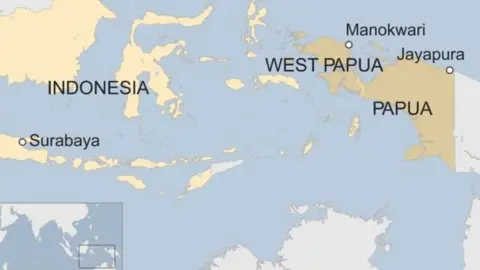
The former Dutch colony initially declared independence in 1961 and its annexation by Indonesia in 1969 was controversial.
And while a referendum was held and overseen by the United Nations, only about 1,000 people were allowed to vote, meaning many Papuans considered the result invalid.
As a result, a low-level separatist movement, fighting for independence, continues to this day.
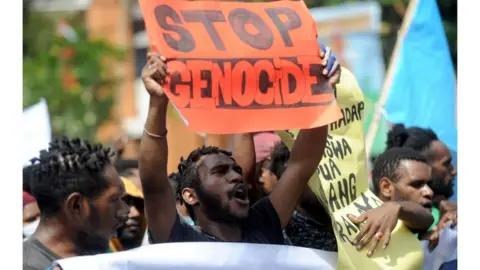 AFP
AFPThe Indonesian military, meanwhile, is accused of gross human rights abuses in their attempt to suppress any form of dissent in the province.
Resentment towards central government is further fuelled by the fact that, while Papua is rich in resources, including the world's biggest gold mine, it remains one of the poorest regions in the country. In February last year, a measles and malnutrition crisis killed at least 72 people, mostly children.
But these protests were triggered by accusations of racism
The groundswell of anger that has fuelled the latest demonstrators was sparked by an incident in the Javanese city of Surabaya at the weekend.
After accusing Papuan university students of damaging an Indonesian flag during Independence Day celebrations, nationalist groups surrounded their boarding house and goaded them with racist taunts, calling them "monkeys", "pigs" and "dogs".
Police in riot gear then stormed the dormitory to force the students out. Authorities said the students were briefly questioned before being set free.
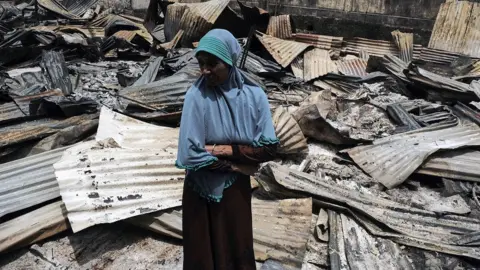 EPA
EPAThis incident, and the protests which followed, exposed simmering fault lines and deep-seated racism within Indonesia, stemming from the fact people indigenous to Papua are Melanesian, ethnically distinct from most of the rest of the country and more closely linked to the neighbouring people of Papua New Guinea.
The exiled West Papua leader, Benny Wenda, told the BBC the treatment of the Papuan students was "just one example of what we have experienced daily for nearly 60 years".
Mr Wenda recalled how, on his first day of high school, an Indonesian girl spat in his face.
"I thought maybe I smelled bad - I washed myself three times that night," he said. "The next day I came in, sat down, and she spat in my face again.
"Then I understood: Indonesians see our black skin as less than equal, they do not see us as human beings. Every Papuan has countless stories like this."
His experiences are echoed by those of Papuan students in Java, who told BBC Indonesian they are often made to feel like second-class citizens.
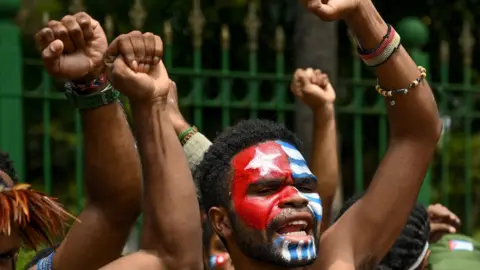 AFP
AFP"I have been turned away from student boarding houses and told that they will not receive boarders who are Papuan students," said Benfa, a Papua student in Yogyakarta.
"We face discrimination and racism daily," Aris Yeimo, from the Papuan student union, added.
Now the fight against racism appears to be entangled with the fight for independence.
Demonstrators this week have been chanting "We are not monkeys" and "Fight racism", while also flying the banned Morning Star flag, a symbol of independence, and crying "freedom for Papua".
"When we talk about fighting racism, we also have to talk about the struggle to decide our own fate," said Albert, who led the demonstrations in the capital Jakarta.
Indonesia's president has sought to defuse the anger...
President Joko Widodo is urging people to forgive each other after the riots, adding that the government will try to look after "the honour and welfare of all people in Papua and West Papua".
"My brothers and sisters in Papua and West Papua, I know you feel offended" he said in a statement. "Therefore, as fellow countrymen, to forgive each other is the best. You may get angry but forgiving is better."
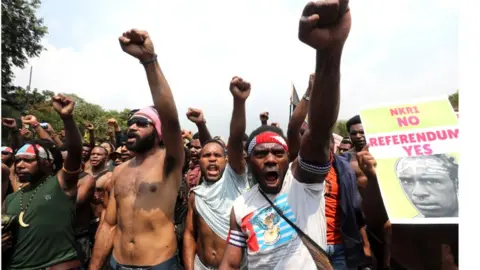 EPA
EPAThere have been other attempts to ease tensions. Papua was granted greater autonomy in 2001, and there has been a significant increase in government funds for the region, with Jakarta vowing to bring prosperity to the people of Papua.
President Widodo has also visited Papua more than six times since his election in 2014, working hard to demonstrate Jakarta's commitment to developing the province.
... But the conflict continues
Papua is the most heavily militarised province in Indonesia and more troops have been sent to the area this week.
But their presence is likely to do little to make some feel safer: reporters from the BBC's Indonesian service visited the remote Nduga area in early August and found women and children civilians too frightened to return home.
They were hiding from a military crackdown which displaced thousands in the wake of an attack by armed independence fighters linked to the Free Papua Movement (OPM), who killed a group of construction workers building a highway through the jungle.
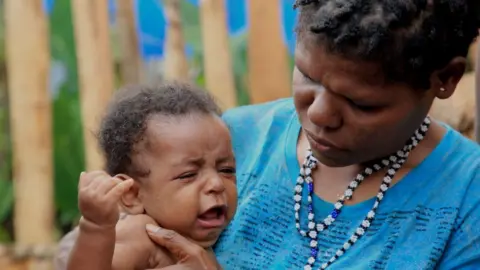 BBC News Indonesia/Oki Budhi
BBC News Indonesia/Oki BudhiJubiana Kogeya gave birth in the jungle and named her baby Refugee.
"I heard that the military had entered our area. There was gunshots and fighting and so we fled our houses and into the jungle," she said.
They will wait in the jungle till it is safe to go home.
But demonstrators' calls for the military and police to be withdrawn from the region this week have fallen on deaf ears - as have those for independence.
Indonesia's chief security minister Wiranto, who goes by one name, has flown to Papua with the head of the military and the national police chief. He appealed for calm, and referred to Papua as the nation's "golden child".
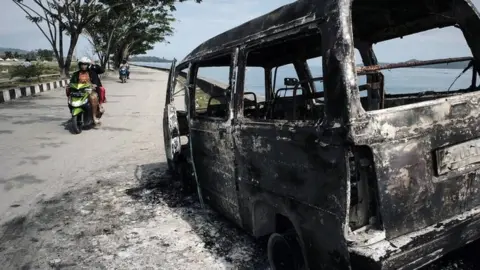 EPA
EPABut his message was clear.
"Indonesia's unity is non-negotiable," the minister told reporters.
Despite this, Papuan independence leaders are demanding a political solution.
"Indonesia has always seen us as animals," said Mr Wenda. "They will never see us as equal.
"The only way to end this abuse and suffering is a peaceful referendum on independence."
Additional reporting by the BBC's Rebecca Henschke and Ayomi Amindoni
